flute
All scores that include a part for at least one flute.
McDonald - Three Four-Note Flute Duets - Two Flutes
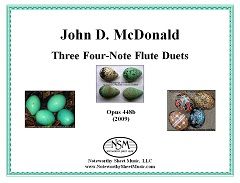 Three Four-Note Flute Duets, Op.448b, by John D. McDonald
Three Four-Note Flute Duets, Op.448b, by John D. McDonald
Contemporary Composition for Two Flutes, PDF $2.99
"Composed for Ethel Farny and her flute students at the Rivers Music School, these short duets sprout initially from the first flute/violin duet of Several Strands, Op. 448a. This Grazioso is indeed made from only four pitches. Similarly, Murmurando confines itself to a four-note knot until its final dyad. The third duet, Con Eleganza, stretches the four-note concept a bit more. Each instrument has its own four-pitch pattern, and a coda leaves the four-note idea behind all together, concluding the set with six slower, somewhat more chromatic bars that could very well lead to future music of more emotional complexity. Perhaps there will be more duets to come." ― John McDonald, November 2009
John McDonald is a member of The Mockingbird Trio, directs the Tufts Composers Concert Series, and serves on the boards of several performance organizations in New England. He has recently fulfilled commissions from The Chamber Orchestra of Boston, pianist David Holzman, The Firebird Ensemble (for an Apple Hill Center for Chamber Music Residency, with support from a Meet the Composer MetLife Creative Connections Award), and the ANA Trio (Fredonia University; soprano, cello, and piano), among others. Recent performances by McDonald at the Goethe Institut of Boston, at Tufts, and at many other venues have been highly acclaimed.
Score for Two Flutes, 2 pages; Total, 4 pages.
McDonald - Three Melodies That Descend - Flute
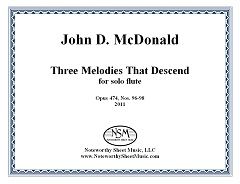 Three Melodies That Descend, Op.474, Nos.96-98 by John D. McDonald
Three Melodies That Descend, Op.474, Nos.96-98 by John D. McDonald
Contemporary Composition for Solo Flute, $2.99
John McDonald is Professor of Music at Tufts University, where he served as Director of Graduate Music Studies from 2000 to 2010 and Department Chair from 2000 to 2003. He was named the 2007 MTNA—Shepherd Distinguished Composer of the Year by the Music Teachers National Association, and received the 2009 Lillian and Joseph Leibner Award for Distinguished Teaching and Advising from Tufts University. In 2010, he received the Waring Prize from Western Reserve Academy, the highest award given to alumni of that school. His recordings appear on the Albany, Archetype, Boston, Bridge, Capstone, Neuma, New Ariel, and New World labels, and he has concertized widely as composer, pianist, and collaborative performer. New releases include pianist Andrew Rangell's performance of McDonald's Meditation Before A Sonata: Dew Cloth, Dream Drapery, on Bridge Records.
McDonald's Three Melodies That Descend, Op.474, Nos.96-98 were written for composer and flutist Joshua Hahn after his graduation from Tufts University in May 2011. They work on the principle that what starts high must come down, and they are also a foil to the Eleven Melodies That Go Up In Different Ways (Op. 474, Nos. 30-40).
Flute part, 2 pages; Total, 4 pages.
Mendelssohn - Concert Piece No.1 - Two Winds and Piano
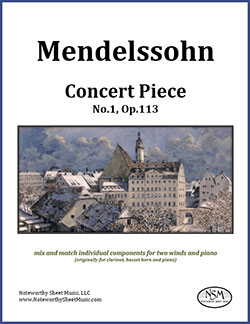 Concert Piece No.1, Op.113, by Felix Mendelssohn
Concert Piece No.1, Op.113, by Felix Mendelssohn
Transcribed for Various Wind Instruments and Piano by John W. Pratt
(originally for Clarinet, Basset Horn, and Piano)
Individual Secondo parts for Bassoon, Clarinet, or English Horn, PDFs $6.99 each
Piano Score, with original Clarinet and Basset Horn lines in concert pitch, PDF $6.99
The following is excerpted from John Pratt's © foreword:
"In 1833, Felix Mendelssohn (1809-1847) wrote two Concert Pieces for Clarinet, Basset Horn, and Piano, op. 113 and op. 114, as show-pieces for the famous clarinetist Heinrich Bärmann (1784-1847) to play with his up-and-coming son Karl (1811-1885) on the basset horn. // Mendelssohn's two Concert Pieces are very suitable for transcription, even aside from the rarity of the basset horn today. We provide, as well as the original clarinet part, transcriptions of it for flute and oboe. Transcriptions of the basset horn part are provided for bassoon, clarinet, and English horn. These primo and secondo parts can be mixed and matched at will. For the score, we use Mendelssohn's instruments rather than some other arbitrary pair. This enables anyone interested to check any transcribed part against the original. The score gives the parts in concert pitch, because a transposition would apply to only one of the possible winds, and because the pianist can then easily play any part at original pitch."
Please note that PDFs of the original score and clarinet-primo part are available free of charge in the public domain (see the listing of this work on IMSLP.org), and our transcribed primo and secondo wind parts can readily be used with the original score. Therefore, you should purchase our original instrument Score or Clarinet-primo part only if you would like measure numbers or Mr. Pratt's score (for piano with clarinet and basset horn) in concert pitch.
- Piano Score with Clarinet and Basset Horn lines in concert pitch, 8 pages; Total, 10 pages (note that the original score is freely available on IMSLP.org)
- Clarinet in B-flat, primo part, 4 pages; Total, 6 pages (note that the original clarinet part is freely available on IMSLP.org)
- Flute, transcribed primo part, 4 pages; Total, 6 pages
- Oboe, transcribed primo part, 4 pages; Total, 6 pages
- Bassoon, transcribed secondo part, 4 pages; Total, 6 pages
- Clarinet in B-flat, transcribed secondo part, 4 pages; Total, 6 pages
- English Horn, transcribed secondo part, 4 pages; Total, 6 pages
Mendelssohn - Concert Piece No.2 - Two Winds (and Piano)
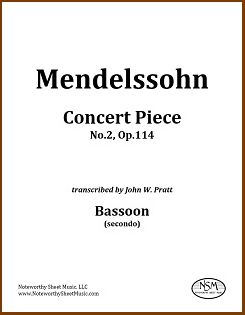 Concert Piece No.2, Op.114, by Felix Mendelssohn
Concert Piece No.2, Op.114, by Felix Mendelssohn
Transcribed for Various Wind Instruments (and piano) by John W. Pratt
(originally for Clarinet, Basset Horn, and Piano)
Primo parts for Clarinet, Flute, or Oboe, PDFs $5.99 each
Secondo parts for Bassoon, Clarinet, or English Horn, PDFs $5.99 each
Each wind part is 4 pages of music; 6 pages total.
Primo parts for Flute, Clarinet in B-flat (note that the original primo clarinet part is freely available on IMSLP.org), or Oboe.
Secondo parts for Clarinet in B-flat, Bassoon, or English Horn. Preview Bassoon II part
Mozart - Quintet, K.515, arr. Flute Quintet
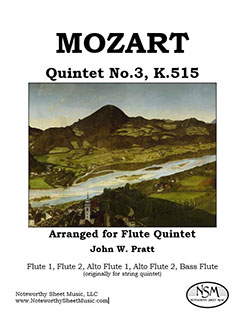 Quintet, K.515, by Wolfgang Amadeus Mozart
Quintet, K.515, by Wolfgang Amadeus Mozart
Arranged for Flute Quintet by John W. Pratt (originally for strings)
Score and Parts for Flute 1, Flute 2, Alto Flute 1, Alto Flute 2, and Bass Flute, PDF $26.50
Wolfgang Amadeus Mozart wrote six quintets for 2 violins, 2 violas, and cello. Two of these, K.515 in C major and K.516 in G minor, are generally regarded as high points in Mozart’s, and indeed all, chamber music. Performances of K.515 are infrequent, far less than such great music deserves, since there is not enough repertoire to support permanent string quintets and string quartets have an abundance of great music to play without needing to find an additional violist. Adaptation to flute quintet is thus particularly apropos, as its textural possibilities apply also to a flute quintet, and its musical and emotional content are well worth viewing through the prism of five flutes. Our edition includes a score as well as parts for two concert flutes, two alto flutes, and bass flute. (adapted from jwp’s foreword to the edition)
Score, 37 pages; Flute 1, 16 pages of music; Flute 2, 14 pages of music; Alto Flute 1, 16 pages of music; Alto Flute 2, 14 pages of music; and Bass Flute, 14 pages of music; Total, 124 pages.
PreviewMozart - Quintet, K.516 - arr. Flute Quintet
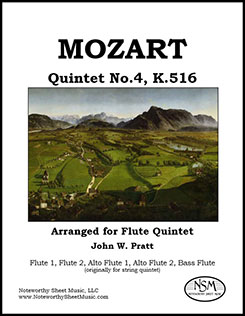 Quintet, K.516 by Wolfgang Amadeus Mozart
Quintet, K.516 by Wolfgang Amadeus Mozart
Arranged for Flute Quintet by John W. Pratt (originally for strings)
Score and Parts for Flute 1, Flute 2, Alto Flute 1, Alto Flute 2, and Bass Flute, PDF $23.50
Wolfgang Amadeus Mozart (1756-1791) wrote six quintets for 2 violins, 2 violas, and cello. Two of these, K.515 in C major and K.516 in G minor, are generally regarded as high points in Mozart’s, and indeed all, chamber music. Adaptation of K.516 to flute quintet is apropos, as its textural possibilities apply also to a flute quintet, and its musical and emotional content are well worth viewing through the prism of five flutes. In John Pratt’s arrangement, the work has been transposed up a step to better adapt to a flute ensemble. Our edition includes a score as well as parts for two concert flutes, two alto flutes, and bass flute.
Score, 30 pages; Flute 1, 14 pages; Flute 2, 13 pages; Alto Flute 1, 14 pages; Alto Flute 2, 13 pages; and Bass Flute, 11 pages of music; Total, 106 pages.
PreviewMozart - Sinfonia Concertante - Fl/Cl/Pf
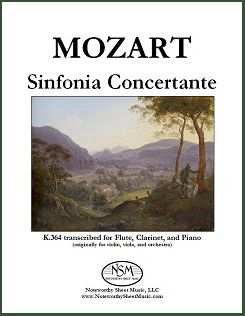 Sinfonia Concertante, K.364, by Wolfgang Amadeus Mozart
Sinfonia Concertante, K.364, by Wolfgang Amadeus Mozart
(originally for Violin, Viola, and Orchestra)
Piano Score, Flute & Clarinet Parts, PDF $17.99
Excerpted from the Foreword by J. W. Pratt: "The idea that every piece, especially a major one, can be satisfactorily transcribed for whatever instruments one would like is one I firmly reject. However, a trio arrangement of this Sinfonia Concertante for flute, clarinet, and piano can, I believe, capture and present in a new light many of the wonders of this great work, even the wonders of its sonorities. .... In the arrangement here, the flute and clarinet almost always play either a solo part or an orchestral part with only octave changes. .... For the piano, on the other hand, straightforward orchestral reduction is often ineffective and unsatisfying, and that would certainly be true here, even with the flute and clarinet taking some wind parts. I have attempted instead to find natural piano "orchestrations" as alternatives to Mozart's orchestral layouts, especially where the full orchestra is playing. .... Such effects, often heightened on returns, are better suited to the piano's capabilities and its role as a member of a trio than a straightforward reduction would be. .... The music available for flute, clarinet, and piano includes surprisingly few major works. The purpose of our arrangement is to add a significant piece to this repertoire and to enable players and listeners to enjoy Mozart's magnificent Sinfonia Concertante in a new way."
Score, 41 pages; Flute part, 18 pages; Clarinet part, 17 pages; Total, 82 pages.
PreviewNelson - Play of Light - Flute & Harp
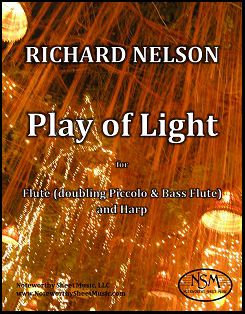 Play of Light, by Richard Nelson
Play of Light, by Richard Nelson
Contemporary Composition for Flute (doubling piccolo & bass flute) and Harp
Score and Flute Part, PDF $15.25
Play of Light, for flute and harp, was written for the duo "2" (Peter H. Bloom and Mary Jane Rupert). The piece is built around spaciousness, transparency, multi-hued shadings and playful chases. The incorporation of bass flute and piccolo further enhances the inherently rich color possibilities of the flute/harp combination—the three flute instruments in succession form a sort of "super-flute" in the work's final section.
Drawing on his jazz and improvisation background, composer Richard Nelson in this composition leads the players into a substantial section that they complete through improvisation. While they follow signposts on intensity, energy and pitch content that he provides, this practice nonetheless creates an element of intrigue and unpredictability that the composer values highly. It also assures that each performance of the piece will have a strongly individual profile.
The Duo "2" artists have released a studio recording of Play of Light, available free of charge; please click the link to listen to the audio file on the composer's SoundCloud site.
Peter H. Bloom gave a lecture on “Effective Writing for Flutes and the Contemporary Flutist” at the 2018 Snow Pond Composers Workshop. In his presentation, Mr. Bloom discussed various topics using four contemporary works published by Noteworthy Sheet Music, including Play of Light, as examples. We later published a free text version of this excellent presentation on our website, in the Reviews and Articles section, including some of the audio clips and supplemental written materials that Mr. Bloom used as demonstrations.
Score, 23 pages; Flute part, 9 pages; Total, 36 pages.
Preview==========================================================
We also offer a print version of Play of Light by Richard Nelson, for those who prefer to purchase the work as a professionally-printed hard copy. Due to prohibitively high international shipping rates, we ship print editions only to addresses in the USA. The cost of the hard copy edition of Play of Light is $25.93, plus a $5.95 shipping and handling fee. Please use the Contact Us form to let us know which print publication(s) you would like to purchase, along with your email contact information and USPS mailing address. We will then send you a PayPal invoice for the sale and, once we receive notice from PayPal that you have paid for the item(s), we will ship your music to the address provided for delivery in 7-10 business days.
Nicholson - Coolun - Fl or Fl & Pf or Fl & Hp
 Coolun, A favorite Irish Air with Four Variations, by C. Nicholson
Coolun, A favorite Irish Air with Four Variations, by C. Nicholson
Gassett Collection - Facsimile Edition by C.A.Vater/Noteworthy Sheet Music
Piano Score and Flute Part, PDF $9.99
Charles Nicholson (1795-1837) was a masterful, hugely popular, and highly influential English flutist and teacher, famous for his individual style and powerful tone. Among Nicholson's compositions are 13 fantasies and 15 airs with variations, including Coolun. A favorite Irish Air with Four Variations arranged for the Flute with an ad libitum Accompaniment for the Piano Forte, or Harp. The "Coulin" or "Coolan" was described in an 1833 letter to the editor of the Dublin Penny Journal (www.libraryireland.com) as "an air, that once heard even in the earliest infancy, can never be forgotten—a melody which breathes the most touching tenderness and exquisite sensibility, and the memory of which, enables the Irish to hear Scotland's 'O, Nanny wilt thou gang with me,'—or her 'Banks and Braes,' without envious repinings."
Nicholson's consummate rendition of Coolun is highly effective when played either as a solo for flute alone or by flute with accompaniment of piano, lever harp, or pedal harp. The Gassett Collection print from which our facsimile was created consists of a score for piano forte and flute, without a separate flute part. The flute part included in our edition was created from the score using a modern music notation software program.
Noteworthy Sheet Music's publication of Coolun was favorably reviewed by Katherine Borst Jones in the January, 2014 issue of Flute Talk magazine. You can read the review, reproduced on our website for your convenience, or at Flute Talk (subscribers).
For additional information about the Gassett Collection, please see see our article An Introduction to the Gassett Collection.
Piano score, 6 pages; Flute part, 5 pages; Total, 15 pages.
Preview==============================================================================
To order our print edition of Coolun, A Favorite Irish Air arranged for Flute and Piano or Harp for $16.98 plus a $5.95 shipping and handling fee to addresses in the USA. Use the Contact Us form to let us know which hard copy publication(s) you would like to purchase, along with your email contact information and USPS mailing address. We will then send you a PayPal invoice for the sale and, once we receive notice from PayPal that you have paid for the item(s), we will ship your music to the address provided.
Popp - Greetings to Hungary - Flute and Piano
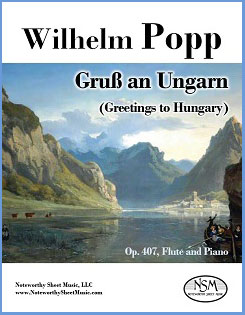 Greetings to Hungary, Op.407, by Wilhelm Popp
Greetings to Hungary, Op.407, by Wilhelm Popp
Flute and Piano
Flute Part and Piano Score, PDF $0.00
Wilhelm Albrecht Otto Popp (1828-1903) was an esteemed German composer, flutist, and pianist. He received his flute training from Caspar Kummer and Louis Drouet, and served as court pianist and flutist at the Ducal Saxon Court Theater in Coburg-Gotha. In 1867 he moved to Hamburg and became first flute of the Hamburg Philharmonic Orchestra. Popp composed some 600 works, many of which were written for flute and piano; most of his compositions were published in his lifetime and were well-known to musicians of his day.
Wilhelm Popp’s Gruß an Ungarn (Greetings to Hungary) was first published for flute and orchestra in 1890, and an edition for flute and piano was published in 1899. NSM re-notated the flute and piano version, changing only the formatting and adding bar numbers and a new cover page. With a decidedly Hungarian sentiment, this piece is great fun to play and provides an enjoyable, exciting listen for audiences as well.
Click for a free download of our re-typeset edition of Popp’s Gruß an Ungarn.
Piano score, 8 pages; Flute part, 5 pages; Total 16 pages.
